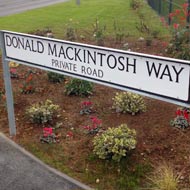Suffolk road named after respected vet

Donald Mackintosh Way leads up to Ipswich Veterinary Centre, a new, state-of-the-art hospital.
A new road in Ipswich has been named after the highly regarded veterinary surgeon, Donald Callendar Mackintosh, who sadly passed away in 2013 at the age of 81.
Affectionately known as 'Mr Mac', Donald was one of the early partners of the Stowe Veterinary Group in Suffolk. Now, 'Donald Mackintosh Way' leads up to the group's newest addition, Ipswich Veterinary Centre, which is a purpose-built, state-of-the-art hospital.
Upon hearing of the decision to name the new road 'Donald Mackintosh Way', his family said: “We are so pleased to learn that the road to Ipswich Veterinary Centre is being named after Don.
 It is a lovely way to remember his contribution to the veterinary profession
It is a lovely way to remember his contribution to the veterinary profession 
Donald was well known and respected in Suffolk's farming community and amongst his peers. He spent the majority of his working life caring for animals in East Anglia, though such was his renown in the pig farming industry, his skills were required all over the country.
Born in Glasgow in 1931, Donald's decision to study veterinary medicine was perhaps a surprising one. At the time, it was not a popular career choice and, in fact, many of the places on the veterinary course had to be filled by students from Norway and Denmark.

After graduating in 1954, Donald spent two years in the army – mostly in Kenya – then as a small animal vet in Surrey.
After getting married in October 1960 and fathering his first child, Donald and family found themselves in Suffolk, where the 'Shorter and Mackintosh' veterinary practice was launched.
Through sheer hard work and competence, the practice expanded, moving to Crowe Street in Stowmarket, before being renamed the Stowe Veterinary Group – which remains a trusted network of practices today.
Roger Harvey, a friend and colleague of Donald's and a partner at the Stowe group, said of the new road name: “It is a lovely way to remember his contribution to the veterinary profession, during a career that spanned over 50 years.”



 The veterinary mental health charity Vetlife is inviting the veterinary community to join it for a sponsored cold-water dip.
The veterinary mental health charity Vetlife is inviting the veterinary community to join it for a sponsored cold-water dip.